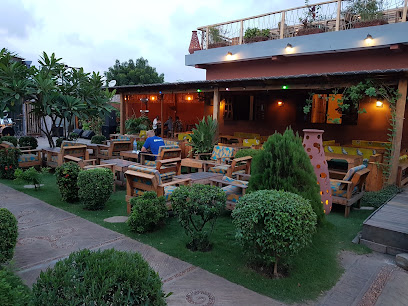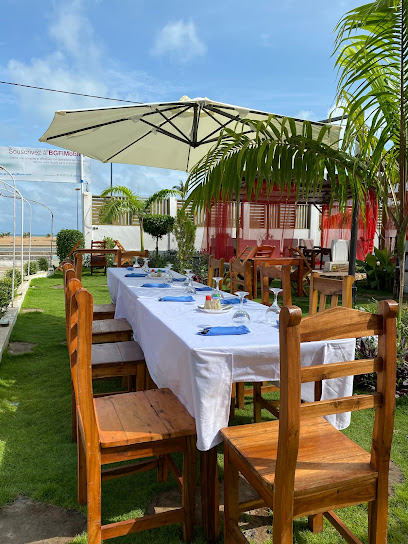
Ganvie: The Venice of Africa
Nestled in the heart of Benin, Ganvie is often referred to as the 'Venice of Africa'. This extraordinary floating village, located on Lake Nokoué, offers a unique experience where the rhythm of life is dictated by the gentle sway of water. Ganvie is a living testament to human ingenuity and adaptation, with houses, markets, and schools all elevated on stilts above the lake. Visitors to Ganvie can immerse themselves in the daily life of the Tofinu people, who have called this waterborne village home for centuries. The village was founded in the 16th and 17th centuries as a refuge from slave traders, and today it stands as a symbol of resilience and resourcefulness. Traditional pirogues, or dugout canoes, glide through the waterways, offering tourists an intimate glimpse into the local way of life. The vibrant market, set in the midst of the lake, is a must-visit. Here, you can shop for fresh fish, handmade crafts, and local delicacies, all while absorbing the lively atmosphere. Ganvie's serene environment, coupled with its rich history and culture, makes it a captivating destination that shouldn't be missed when visiting Cotonou.
Local tips in Ganvie
- Hire a local guide to navigate the village and share its fascinating history.
- Visit early in the day to experience the bustling market at its peak.
- Bring a hat and sunscreen, as the sun can be intense on the water.
- Respect the local customs and ask for permission before taking photos of residents.
- Try the local fish dishes at one of the floating restaurants for an authentic culinary experience.
Ganvie: The Venice of Africa
Nestled in the heart of Benin, Ganvie is often referred to as the 'Venice of Africa'. This extraordinary floating village, located on Lake Nokoué, offers a unique experience where the rhythm of life is dictated by the gentle sway of water. Ganvie is a living testament to human ingenuity and adaptation, with houses, markets, and schools all elevated on stilts above the lake. Visitors to Ganvie can immerse themselves in the daily life of the Tofinu people, who have called this waterborne village home for centuries. The village was founded in the 16th and 17th centuries as a refuge from slave traders, and today it stands as a symbol of resilience and resourcefulness. Traditional pirogues, or dugout canoes, glide through the waterways, offering tourists an intimate glimpse into the local way of life. The vibrant market, set in the midst of the lake, is a must-visit. Here, you can shop for fresh fish, handmade crafts, and local delicacies, all while absorbing the lively atmosphere. Ganvie's serene environment, coupled with its rich history and culture, makes it a captivating destination that shouldn't be missed when visiting Cotonou.
Iconic landmarks you can’t miss
Red Star Square
Explore the vibrant atmosphere and rich history of Red Star Square, a captivating cultural hub in the heart of Cotonou, Benin.
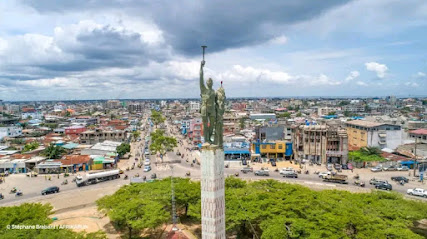
Amazon Statue
Explore the Amazon Statue in Cotonou, a stunning tribute to Benin's cultural heritage and a must-visit for art enthusiasts and history lovers alike.
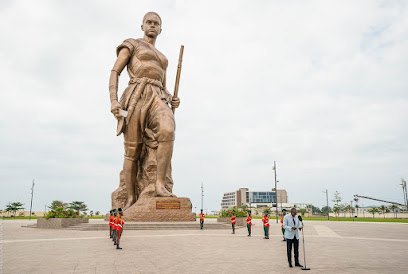
Place du Souvenir, ex Place des Martyrs
Explore the rich history and vibrant culture at Place du Souvenir, a historical landmark in Cotonou, Benin, commemorating the nation's heroes.
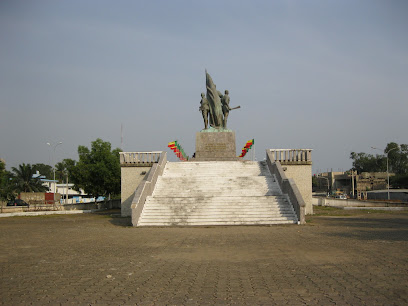
Bulgarian Square Georgi Dimitrov
Explore Bulgarian Square Georgi Dimitrov in Cotonou, a vibrant hub of culture, community, and authentic Beninese experiences.
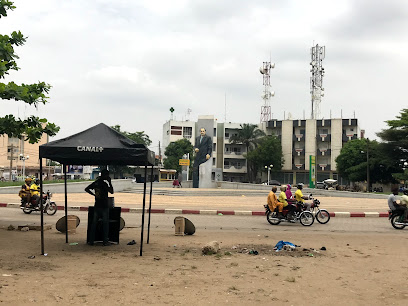
Toffa
Discover the spiritual and historical significance of Toffa, a landmark in Porto-Novo, where culture and tranquility intertwine.
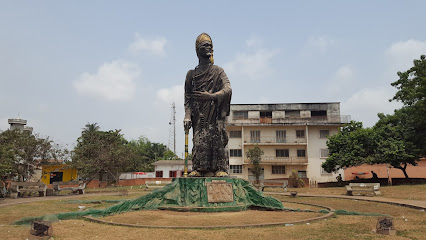
Monument Bio Guera
Explore the Monument Bio Guera in Cotonou, a historical landmark that embodies Benin's rich heritage and cultural significance.
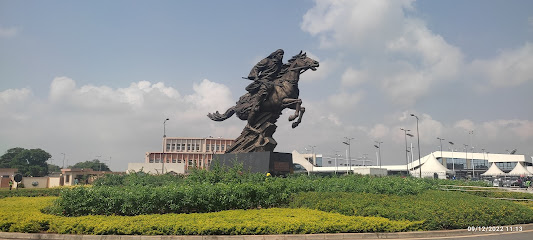
Place de l'amazone
Explore the Place de l'Amazone, a historical landmark in Cotonou celebrating the legendary female warriors of Benin's cultural heritage.
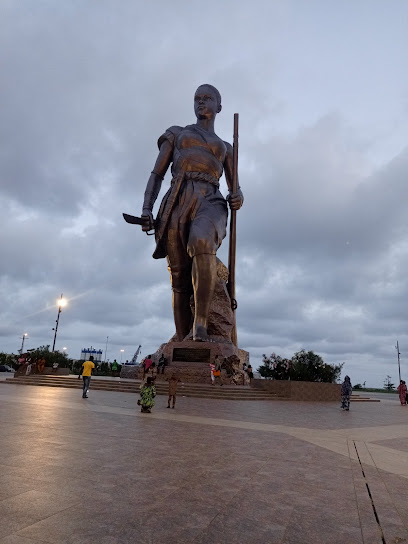
Monument aux Dévoués
Explore the Monument aux Dévoués in Cotonou, a historical landmark honoring the sacrifices made for the nation, surrounded by vibrant local culture.
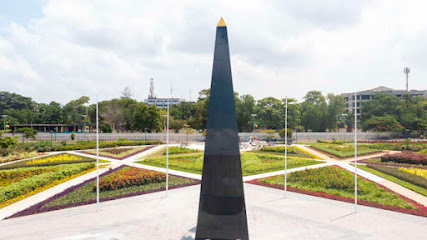
Place des Martyrs
Discover resilience and history at Place des Martyrs, a museum in Cotonou celebrating the spirit of the Beninese people.
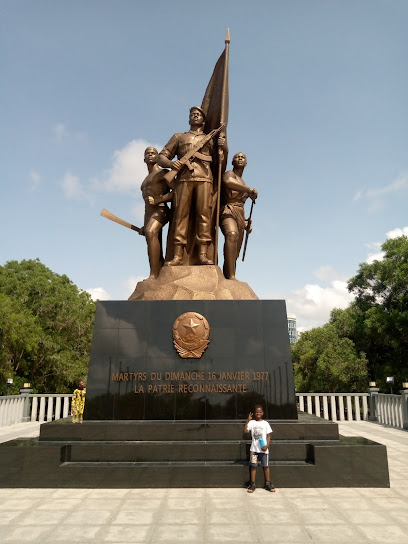
Benin en Image
Explore the rich culture and artistry of Benin at Benin en Image, a captivating hub of creativity and inspiration in Cotonou.
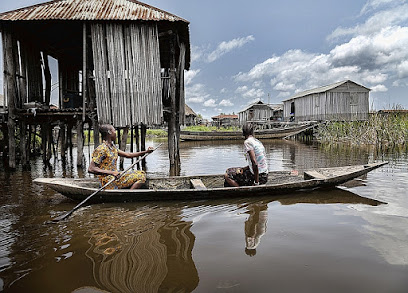
Markets, malls and hidden boutiques
BOUTIQUE WOODIN BAR-TITO
Discover unique African fashion and textiles at Boutique Woodin Bar-Tito, a colorful shop in Cotonou offering vibrant clothing and fabrics.
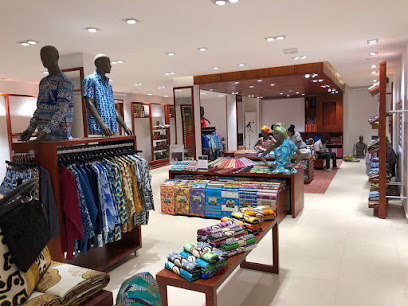
Boutique Woodin Ganhi
Explore the colorful world of African fabrics and contemporary fashion at Boutique Woodin Ganhi, a gem in Cotonou's vibrant shopping scene.
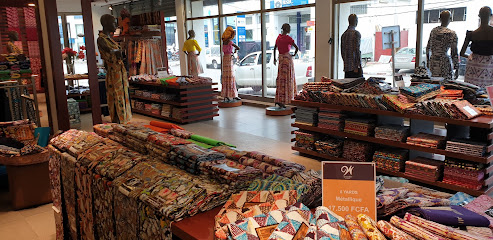
Boutique Vlisco Ganhi
Explore the colorful world of Beninese textiles at Boutique Vlisco Ganhi, a premier destination for unique fabrics and authentic craftsmanship.
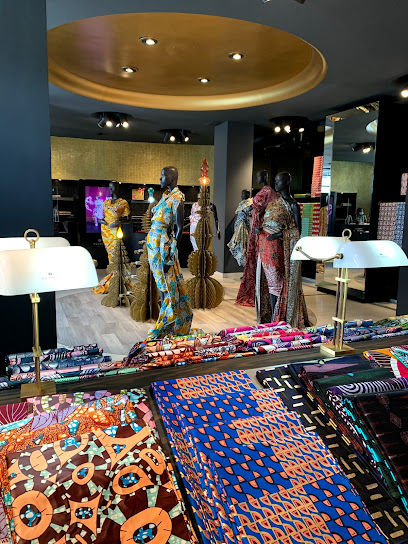
Marché des Arts de Cotonou
Explore the vibrant Marché des Arts de Cotonou, a treasure trove of handcrafted goods and local artistry in the heart of Benin.
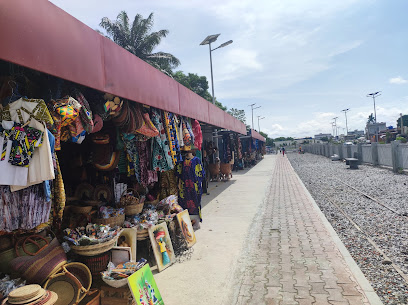
Boutique LOLO Andoche
Explore the vibrant clothing styles of Benin at Boutique LOLO Andoche, a unique shopping experience in Cotonou.
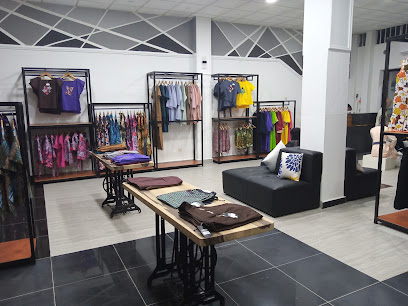
WATCH-SHOP BENIN
Explore the finest selection of watches and sunglasses at Watch-Shop Benin, where elegance meets quality in Cotonou's vibrant shopping scene.
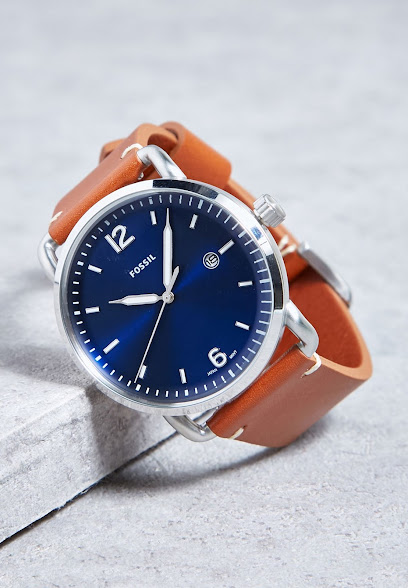
Coin de Gloire
Explore Coin de Gloire in Cotonou for exquisite lingerie that combines luxury and comfort for every woman's wardrobe.
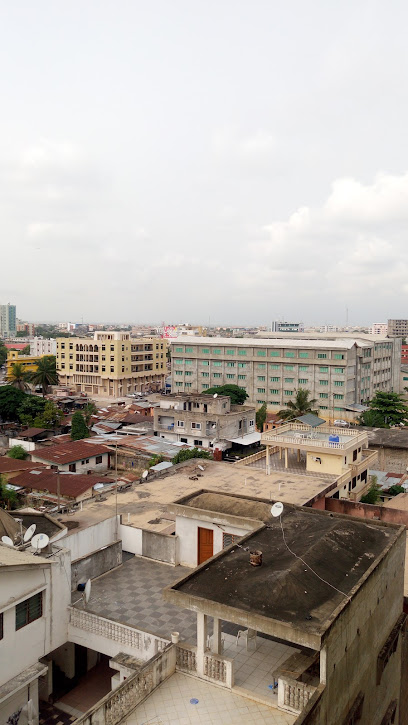
Woodin
Explore Woodin, a unique gift shop in Cotonou, where you can find authentic souvenirs reflecting the rich culture and artistry of Benin.
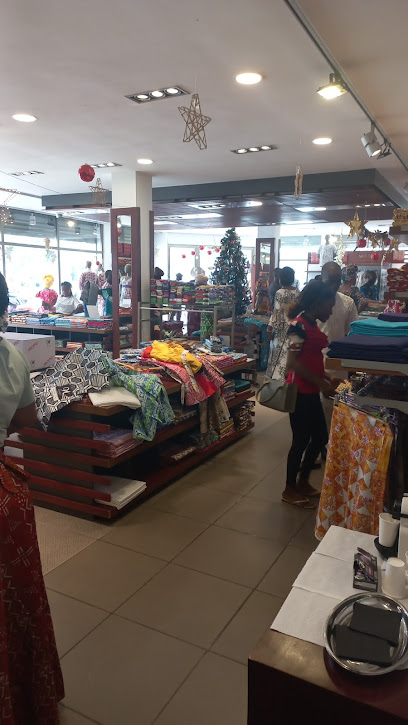
Kiabi Cotonou
Explore the stylish offerings of Kiabi Boutique in Cotonou, where local culture meets modern fashion in an inviting shopping experience.

CALINESS
Explore Caliness Gift Shop in Cotonou for unique handmade treasures and local crafts that celebrate the rich culture of Benin.

Essential bars & hidden hideouts
Code Bar
Discover the vibrant nightlife at Code Bar in Cotonou, where lively music meets an eclectic drink selection in a welcoming atmosphere.
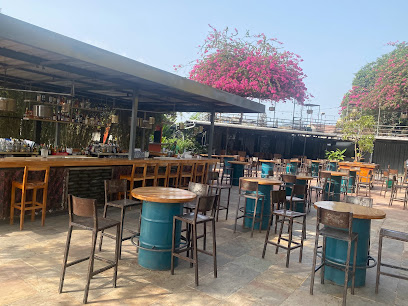
Le Lieu Unique
Experience the flavors of Benin at Le Lieu Unique, where local cuisine meets international flair in a charming setting.
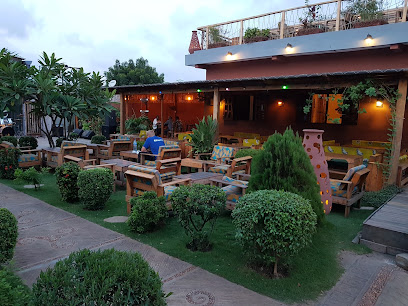
La Villa Classic Lounge Bar
Discover the vibrant nightlife of Cotonou at La Villa Classic Lounge Bar, where cocktails and live music create an unforgettable experience.
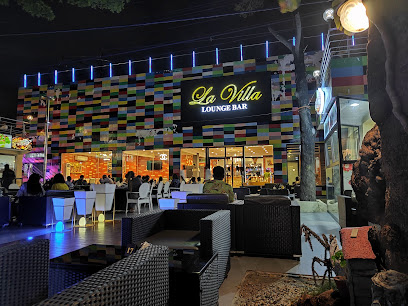
La congolaise bar
Discover La Congolaise Bar in Cotonou, a lively spot for refreshing drinks, vibrant atmosphere, and a taste of local culture.
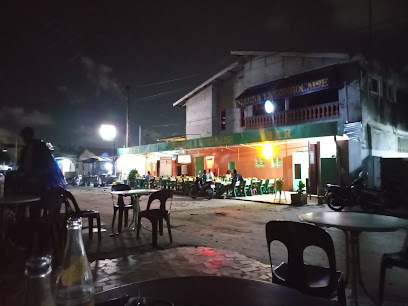
Veniz Lounge-Bar/Restaurant
Discover the vibrant flavors and nightlife at Veniz Lounge-Bar/Restaurant, a premier cocktail bar and dining venue in the heart of Cotonou.
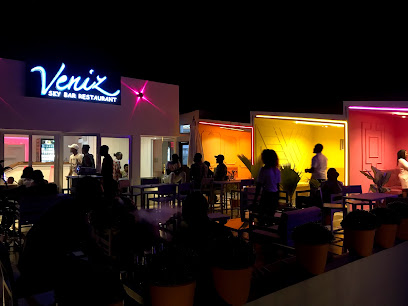
Le Djabi lounge bar
Experience the vibrant nightlife of Cotonou at Le Djabi Lounge Bar, where delicious tapas and refreshing cocktails await in a lively atmosphere.
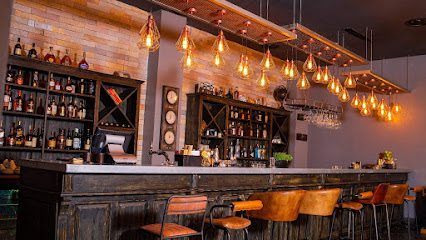
Moon Bar-Restaurant / Cotonou
Discover the culinary charm of Moon Bar-Restaurant in Cotonou, where ocean views and delightful dishes create unforgettable experiences.
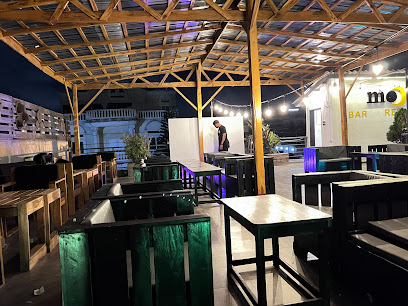
Le PANENKA Bar/ Cocktail / Shot
Discover the vibrant cocktail scene at Le PANENKA Bar in Cotonou, where exquisite drinks and lively ambiance meet.
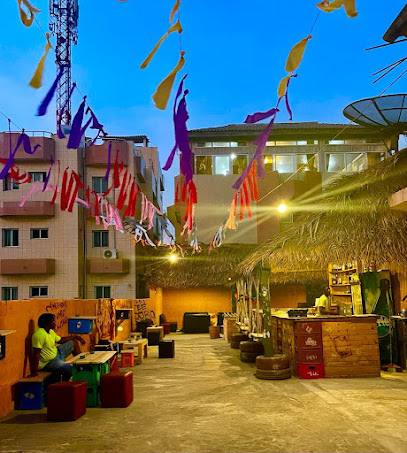
LUCK Lounge Benin
Immerse yourself in the lively ambiance and local flavors at LUCK Lounge Benin, the ultimate spot for relaxation and entertainment in Cotonou.
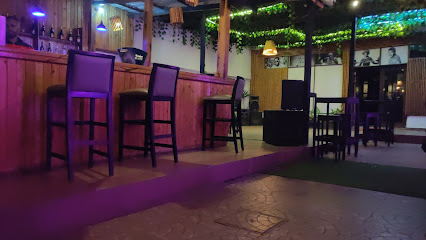
BAR -RESTAURANT LA SOURCE GI
Discover LA SOURCE GI, Cotonou's ultimate sports bar, where delicious food meets an electrifying atmosphere for sports enthusiasts.
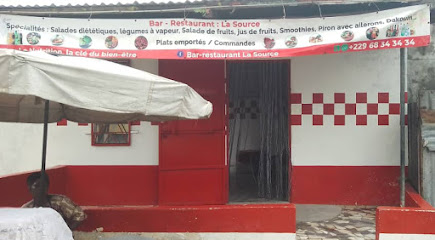
Local Phrases
-
- HelloẸ ku abọ
[eh-koo ah-boh] - GoodbyeOdabo
[oh-dah-boh] - YesBẹẹni
[bay-nee] - NoBẹ
[bay] - Please/You're welcomeJọwọ
[joh-woh] - Thank youO ṣe
[oh sheh] - Excuse me/SorryṢe mi
[sheh me] - How are you?Bawo ni?
[bah-woh nee] - Fine. And you?Daadaa. Ki ni nkan?
[dah-dah. kee nee n-kahn] - Do you speak English?Ṣe o mọ Ede Geesi?
[sheh oh moh eh-deh gay-see] - I don't understandMi o le mọ
[mee oh leh moh]
- HelloẸ ku abọ
-
- I'd like to see the menu, pleaseẸ dá mi lọwọ aṣọ oju, jọwọ
[eh dah mee low-woh ah-shaw oh-joo, joh-woh] - I don't eat meatMi o nje ẹran
[mee oh n-jeh eh-rahn] - Cheers!Ẹ ku Aarọ!
[eh-koo ah-roh] - I would like to pay, pleaseMo fẹ rẹ lọwọ, jọwọ
[moh feh reh low-woh, joh-woh]
- I'd like to see the menu, pleaseẸ dá mi lọwọ aṣọ oju, jọwọ
-
- Help!Ẹ gbọ mi
[eh goh me] - Go away!Jọwọ lọ
[joh-woh loh] - Call the Police!Wọle Ipinlẹ!
[woh-leh ee-pin-leh] - Call a doctor!Wọle dokita!
[woh-leh doh-kee-tah] - I'm lostMo ti jẹ ọwọ
[moh tee jeh oh-woh] - I'm illMo ti jẹ ọkan
[moh tee jeh oh-kahn]
- Help!Ẹ gbọ mi
-
- I'd like to buy...Mo fẹ ra...
[moh feh rah] - I'm just lookingMo n lo wo
[moh n loh woh] - How much is it?Ẹ kọ ni ńwo?
[eh koh nee n-woh] - That's too expensiveO rẹ ti pọju lọ
[oh reh tee po-juh loh] - Can you lower the price?O le kọ lọwọ ni?
[oh leh koh low-woh nee]
- I'd like to buy...Mo fẹ ra...
-
- What time is it?Kini ọkan?
[kee-nee oh-kahn] - It's one o'clockOkan nii
[oh-kahn nee] - Half past (10)Labẹjọ
[lah-beh-joh] - MorningỌsan
[oh-sahn] - AfternoonỌjọ rẹ
[oh-joh reh] - EveningỌjọ rẹ
[oh-joh reh] - YesterdayNọmbẹ
[nohm-beh] - TodayỌn
[ohn] - TomorrowỌla
[oh-lah] - 1Okan
[oh-kahn] - 2Meji
[meh-jee] - 3Mẹta
[meh-tah] - 4Mẹrin
[meh-reen] - 5Marundinlogun
[mah-roon-dee-nlo-goon] - 6Mefa
[meh-fah] - 7Meje
[meh-jeh] - 8Marundinlogode
[mah-roon-dee-nloh-goh-deh] - 9Mokanla
[moh-kahn-lah] - 10Mẹwa
[meh-wah]
- What time is it?Kini ọkan?
-
- Where's a/the...?Nibo ni...?
[nee-boh nee] - What's the address?Kini adirẹsi?
[kee-nee ah-deh-reh-see] - Can you show me (on the map)?O le fi mi se (ni iwe ati)
[oh leh fee mee sheh (nee ee-weh ah-tee)] - When's the next (bus)?Nibo lẹhin wọn (ọkọ)?
[nee-boh leh-heen wohn (oh-koh)] - A ticket (to ....)Tikẹti (si ....)
[tee-keh-tee (see)]
- Where's a/the...?Nibo ni...?
History of Ganvie
-
Ganvie, often referred to as the 'Venice of Africa,' is a remarkable stilt village located on Lake Nokoué, just outside Cotonou. The village was founded in the 17th century by the Tofinu people, who sought refuge from the slave trade and the Fon warriors of the region. The construction of stilt houses allowed the community to live on water, providing safety from invaders and abundant fishing resources.
-
Ganvie is home to the Tofinu people, whose unique culture is deeply intertwined with the lake and its resources. The community practices traditional fishing methods, utilizing canoes and nets that have been passed down through generations. Festivals and rituals celebrating water spirits, known as 'Mami Wata,' reflect the community's spiritual connection to the lake. The vibrant markets and colorful boats add to the cultural landscape, showcasing local crafts and culinary delights.
-
During the colonial era, Ganvie became a site of interest for European explorers and traders. The village's unique lifestyle and its strategic location made it a point of curiosity. While the French colonizers established Cotonou as a port city, Ganvie remained relatively insulated from direct colonial influence, allowing it to preserve much of its traditional way of life.
-
In recent decades, Ganvie has faced challenges related to environmental changes and urbanization of Cotonou. Rising water levels and pollution threaten the stilt structures and the livelihoods of the residents. However, the village has embraced tourism as a means of economic sustainability, attracting visitors eager to experience its unique culture and scenic beauty. Efforts are underway to balance tourism with the preservation of Ganvie's heritage and ecological integrity.
-
Ganvie's rich cultural heritage and stunning landscapes have garnered international attention. It has been recognized by the United Nations as a site of cultural significance. The village continues to be a living example of resilience, showcasing the ability of its people to adapt while maintaining their traditions. Various initiatives aim to promote cultural awareness and safeguard the traditions of the Tofinu people for future generations.
Ganvie Essentials
-
Ganvie is located approximately 10 kilometers from Cotonou city center. To reach Ganvie, you can take a taxi or a motorcycle taxi (zemidjan) from Cotonou. The journey typically takes about 30 minutes, depending on traffic. Alternatively, you can take a public bus to the port of Ganvie, which is another popular option. Once you arrive at the port, you will need to take a boat taxi to reach the village itself, as Ganvie is situated on Lake Nokoué.
-
Ganvie is a water village, and the primary mode of transport is by boat. You can hire a local canoe or motorboat for short trips around the village. Walking is also common for shorter distances. There are no trains or buses in Ganvie. It's advisable to negotiate the price for boat rides upfront, and consider hiring a local guide for a more informative experience.
-
Ganvie is generally safe for tourists, but it is always wise to stay vigilant. Avoid displaying expensive items such as jewelry or electronics. Be cautious around the waterfront and avoid wandering into secluded areas, especially at night. While there are no specific high-crime areas targeting tourists, ensure you are aware of your surroundings and travel in groups when possible.
-
In case of an emergency, contact local authorities or your hotel for assistance. The nearest medical facilities are in Cotonou, so it is advisable to have travel insurance that covers medical emergencies. For minor issues, there are local first-aid kits available in some shops. Always have a local contact or guide’s number handy for emergencies.
-
Fashion: Do dress modestly, especially when visiting local homes. Light, breathable clothing is recommended due to the warm climate. Don't wear revealing clothing. Religion: Do respect local customs and traditions. Do not engage in loud conversations near places of worship. Public Transport: Do be polite and offer your seat to the elderly. Don't eat or drink on public transport. Greetings: Do greet locals with a smile and a handshake. Don't assume familiarity; greetings should be respectful. Eating & Drinking: Do try local dishes and accept food offerings graciously. Don't refuse hospitality, as it may be seen as rude.
-
To experience Ganvie like a local, take time to chat with residents, especially the fishermen and artisans, who can share insights about their way of life. Visit the local markets for fresh produce and traditional crafts. Don’t miss the opportunity to witness the unique stilt houses and the vibrant lifestyle on the water. Consider taking a guided boat tour to explore the surrounding wetlands and spot local wildlife.
Nearby Cities to Ganvie
-
Things To Do in Porto-Novo
-
Things To Do in Ouidah
-
Things To Do in Lokossa
-
Things To Do in Aneho
-
Things To Do in Lagos
-
Things To Do in Abeokuta
-
Things To Do in Lomé
-
Things To Do in Notse
-
Things To Do in Atakpamé
-
Things To Do in Ibadan
-
Things To Do in Kpalimé
-
Things To Do in Ho
-
Things To Do in Koforidua
-
Things To Do in Accra
-
Things To Do in Benin City






